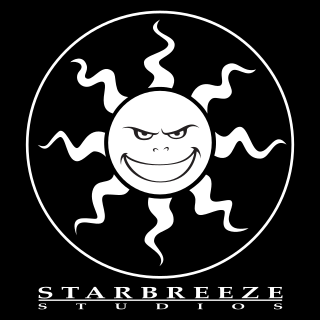Related Research Articles
A video game developer is a software developer specializing in video game development – the process and related disciplines of creating video games. A game developer can range from one person who undertakes all tasks to a large business with employee responsibilities split between individual disciplines, such as programming, design, art, testing, etc. Most game development companies have video game publisher financial and usually marketing support. Self-funded developers are known as independent or indie developers and usually make indie games.

The video game industry encompasses the development, marketing, and monetization of video games. The industry encompasses dozens of job disciplines and thousands of jobs worldwide.

The International Game Developers Association (IGDA) is a nonprofit professional association whose stated mission is to "support and empower game developers around the world in achieving fulfilling and sustainable careers."

Starbreeze Studios AB is a Swedish video game developer and publisher based in Stockholm. Notable games developed include The Chronicles of Riddick: Escape from Butcher Bay, Payday 2 and Brothers: A Tale of Two Sons. Founded by members of the demogroup Triton, the company was merged with O3 Games in 2002 wherein the Starbreeze name was retained. The company produced titles including Enclave and Knights of the Temple: Infernal Crusade. In the early 2000s, cancellations of their projects due to conflicts with publishers and a failed acquisition led to a severe financial crisis, resulting in staff lay-offs during the development of Starbreeze's fourth game, The Chronicles of Riddick: Escape from Butcher Bay. This game received critical acclaim and helped Starbreeze establish a reputation for producing quality games. The company worked on The Darkness, whose sales were considered satisfactory.

Paradox Interactive AB is a video game publisher based in Stockholm, Sweden. The company started out as the video game division of Target Games and then Paradox Entertainment before being spun out into an independent company in 2004. Through a combination of expanding internal studios, founding new studios and purchasing independent developers, the company has grown to comprise nine first-party development studios, including their flagship Paradox Development Studio, and acts as publisher for games from other developers.
Ready at Dawn Studios LLC (RAD) is an American video game developer located in Irvine, California and is composed of former members of Naughty Dog and Blizzard Entertainment. Formed in 2003, the company has primarily worked on games for the PlayStation Portable (PSP), most notably the Sony Computer Entertainment intellectual property God of War and Daxter. Ready at Dawn also now has a satellite campus in Portland, Oregon to assist with future PC and console game development. The studio is now part of Oculus Studios as of June 2020.

Australian rules football in New Zealand is notable as the first colony outside of Australia to take up the sport as early as the 1860s. The official name for the sport between 1890 and 1914 was Australasian Football in acknowledgement of New Zealand's participation. After a half century hiatus of organised competition, it has grown rapidly as an amateur sport. Today there are more than five organised competitions located in various regions across the country including Auckland; Canterbury; Wellington; Waikato; Otago, Queenstown and a four-team national competition with a national draft has been contested at the North Harbour Stadium in Auckland since 2016. The national team, The Hawks, have competed against the AFL Academy and were crowned International champions in 2005.

Metia Interactive is a game development studio based in Auckland, New Zealand. They are a member of the NZGDA. Metia Interactive specialises in designing and creating game art assets, including modelling and texturing, as well as pre-rendered and realtime animations.

Michael V. Capps or Mike Capps is an American video game designer who was the president of Epic Games, based in Cary, North Carolina from 2002 to 2012. In 2018, he co-founded a new artificial intelligence company called Diveplane Corporation. He has been described as "a legendary figure in the video game industry."
Within the video game industry there are several awards that are given to individual video games, development studios, and other individuals to recognize their merit. Most video game awards are given out on an annual basis, celebrating the best games of the previous year. Most of these awards come from organizations directly within the industry, but there also exist several that come from broader media groups. In addition, many video game publications supply their own end of the year awards.
KiwiRail Holdings Limited is a New Zealand state-owned enterprise responsible for rail operations in New Zealand, and operates inter-island ferries. Trading as KiwiRail and headquartered in Wellington, New Zealand, KiwiRail is the largest rail transport operator in New Zealand. KiwiRail has business units of KiwiRail Freight, The Great Journeys of New Zealand and Interislander. KiwiRail released a 10-Year Turn-around Plan in 2010 and has received significant government investment in support of this in an effort to make KiwiRail a viable long-term transport operator.
In New Zealand, 67% of the population play video games, 46% of video game players are female and the average age of a video game player is 34. New Zealanders spend an average of 88 minutes a day playing video games.
Stickmen Studios was formed in 2006 and creates games for various computer platforms. Its sister company is CerebralFix Limited, a social media network game development studio founded in 2009. Both companies are based in Christchurch, New Zealand, and their products target the internet download market.

Owlchemy Labs is a video game developer based in Austin, Texas. The company was founded in 2010 by Worcester Polytechnic Institute graduate Alex Schwartz. Owlchemy is best known for its virtual reality video games Job Simulator and Rick and Morty Simulator: Virtual Rick-ality. In May 2017, the studio was acquired by Google.

Grinding Gear Games is a New Zealand video game developer company founded in 2006 and based in Auckland. A former independent developer, the studio was acquired by Chinese tech company Tencent in May 2018, after the Chinese company had published the studio's sole title, Path of Exile, in China. The open-beta build of Path of Exile was released worldwide in January 2013 and the 1.0 version of the game was released in October 2013.
Ninja Kiwi, previously known as Kaiparasoft Ltd, is a mobile and online video game developer founded in Auckland, New Zealand, in 2006 by brothers Chris and Stephen Harris. Ninja Kiwi's first game was a browser based game called Cash Sprint, developed on the Adobe Flash Platform. Since then, they have produced more than 60 games across platforms including Adobe Flash, Android, iOS, PlayStation Portable, Nintendo DS, and more recently, Steam. Their most well-known titles are the Bloons and Bloons Tower Defense games. In 2012, Ninja Kiwi purchased Digital Goldfish, a Dundee, Scotland-based developer, for an undisclosed sum.

Martin Kenwright is the founder of British-based virtual and augmented reality innovation company vTime Limited, digital media, entertainment and technology company Starship, and video game development studios Digital Image Design (DID) and Evolution Studios. He created seminal computer games such as F29 Retaliator and EF2000. He is also responsible for the World Rally Championship franchise and PlayStation 3 launch title, MotorStorm, along with its respective franchise.
The Interactive Games and Entertainment Association (IGEA) is the industry association for computer and video games in Australia and New Zealand.
Video games in Turkey is a massive industry with many branches of it and also covers pastime in Turkey that includes the production, sale, import/export, and playing of video games.

Defiant Development Pty Ltd was an Australian independent video game developer based in Brisbane. It was formed in May 2010 by Morgan Jaffit and Dan Treble, veterans of Pandemic Studios, in the aftermath of the closures of several larger video game studios in the country. Defiant primarily developed mobile games until 2013, when it moved to larger projects with Hand of Fate. The game was released in 2015 following a successful Kickstarter campaign and a Steam Early Access phase, and it was followed by a sequel, Hand of Fate 2, in 2017. Defiant avoided "crunch" and Jaffit was outspoken about his opposition to the practice, as well as his support for a trade union. In July 2019, the studio was wound down due to what Jaffit called a "risky" business model and failure to adapt to changing market conditions. The studio ceased game development, thereby cancelling The World in My Attic, and planned to further support its existing games.
References
- ↑ "NZGDC". New Zealand Game Developers Conference. Retrieved 2019-04-01.
- ↑ "NZ Game Development Survey 2020".
- ↑ "Board Members – NZGDA".